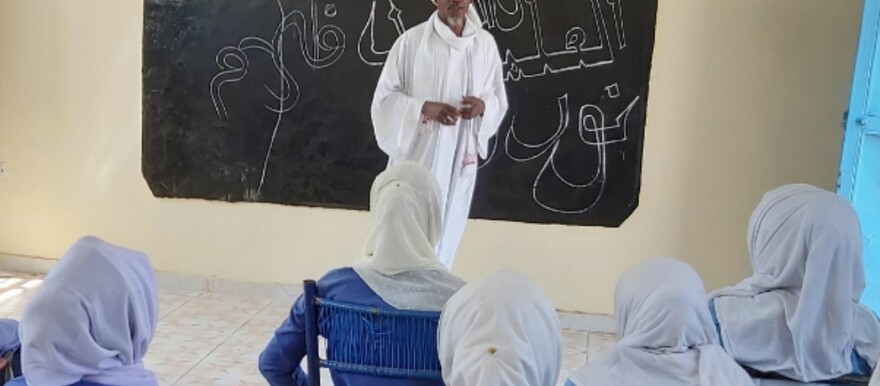A teacher in Sudan’s Central Darfur State has said the war raging across most of the country between the army and the paramilitary Rapid Support Forces (RSF) has paralyzed the education system in the state.
Bidour Zakaria Mohamed Yahia, a secondary school teacher in the Azum locality of Zalenji town in Central Darfur said that until 2012, they faced many challenges but that the current “senseless war” has completely brought the education system to a standstill.
“The war has affected Sudan in general and Darfur in particular. When we talk about Darfur, we see the impact on the economic, psychological, social, and health levels. The living conditions have drastically deteriorated which has impacted the students psychologically,” he explained. “Also, there is huge social pressure due to mass displacements and the deterioration of the health conditions. All of this impacted the education system. The schools in Darfur were already closed before the outbreak of the conflict on 15 April due to the insecurity in the region but now the schools remain closed with no prospects of reopening soon.”
“This will negatively impact us in Darfur and Sudan in general and we are going to lose a whole generation because of the war and it will contribute to increasing the level of illiteracy,” Mahamed added.
He said there were about 26 primary and secondary schools in the Azum locality where he worked with nearly 500,000 students in secondary school.
“10 percent of the secondary school students might have joined the armed opposition groups. This is because those students are underage and the only option for them to protect themselves and their families from violations and atrocities is to join the armed groups,” Mohamed explained. “Therefore, we have lost many students and this is a great loss to the locality, the state, and the entire country.”
According to the teacher, there were many challenges even before the outbreak of the war including a poor schooling environment.
“Most of the schools in Central Darfur State had better conditions but the schools outside the state are in a very bad state. The classrooms are in a poor condition and there is a lack of teaching equipment,” he stated. “The issue of insecurity also hindered the learning process and the curriculum was changed several times. This affected the education process and the teachers and pupils suffered as a result. Lastly, there was a lack of training and capacity building for us the teachers.”
Asked what solutions he would recommend to end the war, Mohamed said the current conflict is very complicated because it has created insecurity at a massive scale and people have been displaced several times.
“It caused a shortage of food and disconnected people. All these are complicated and very critical issues for us. In my view, one of the root causes of the conflict is the 25 October 2021 coup. Second was the proliferation of weapons and the huge number of militia groups like RSF, Janjaweed, and other opposition movements. Also, there is a conflict of interest among the warring parties. Lastly, the absence of the rule of law means there is no country, there is no legal system,” he stated. “All of these issues have complicated the situation. If we are to talk about the solutions, the most important is to institute an immediate ceasefire. If there is no ceasefire, we cannot solve anything. Secondly, there is a need for safe humanitarian corridors and the belligerents must go for negotiations to end the war.”
The schoolteacher urged the international community to immediately intervene to end the war.
“I also call on all human rights organizations to investigate the atrocities being committed in Sudan, especially in Darfur, and urged humanitarian organizations to assist,” Mohamed appealed. “People are in dire need of shelter, food, medicine, and protection.”




